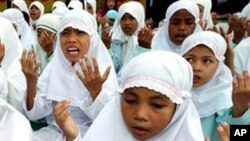An international children's charity says four out of five so-called orphans around the world have at least one living parent. Save the Children says 90 percent percent of children thought to be orphans in Ghana are not.
According to research by Save the Children, over 90 percent of the children though to be orphans in Central and Eastern Europe, Indonesia, and Ghana are not actually orphans but have at least one living parent. In Liberia, the figure is said to be 88 percent.
In a new report, the charity describes how children are treated as commodities in an industry that recruits children in order to profit from international adoption and child trafficking.
Louise Melville from Save the Children says in some countries running an orphanage is lucrative because, she says, governments and well-intentioned donors invest heavily in orphan care.
"Orphanages tend to attract a lot of donations from well meaning individuals, churches and other organizations," she said. "And I think a lot of people don't realize that the vast majority of children in those orphanages have one or both parents living in the same community as their child."
The report says parents who give their children to orphanages may do so in the hopes of giving them a good education. It says often parents believe their children will be returned to them when they are older.
Melville says the orphans often live in bad conditions.
"We see that, for example, children under three in particular can experience permanent brain damage from the lack of individualized care," she said. "Very often you see children with severe growth stunting so they look far younger than their actual age. Even in Western context, we know that children who live in institutions for long periods have worse outcomes."
Melville says poor families should be supported so that they can look after their children themselves.
"Most of those children in the orphanages have families who require small amounts of support to be able to resume the care of their child," she said.
Save the Children's research has been rejected by some orphanages.
Speaking to British media, the head of a Liberian orphanage dismissed the allegations, saying Liberians were taking care of Liberian children. He said many foreigners are blocked from adopting Liberian children and that child trafficking is not a problem.
According to U.N. figures, 8 million children live in orphanages and other institutions around the world.
News
Children's Charity: Most 'Orphans' Do Have Living Parent
update

An international children's charity says four out of five so-called orphans around the world have at least one living parent.